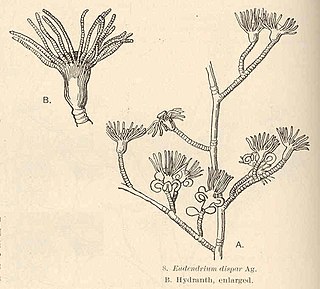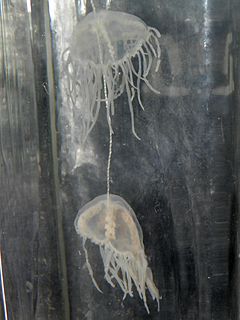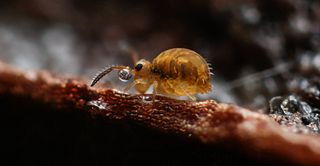 W
WCliona viridis, commonly called the green boring sponge, is a species of demosponge in the family Clionaidae. Its form varies according to the nature of the surface on which it grows. In limestone and other calcareous substrates it excavates channels and chambers while on other types of rock it encrusts the surface or forms massive structures. It is native to the eastern Atlantic, the Mediterranean Sea and the Indo-Pacific Ocean.
 W
WCrambe crambe, commonly known as the oyster sponge or orange-red encrusting sponge, is a species of demosponges belonging to the family Crambeidae.
 W
WEudendrium dispar is a marine species of cnidaria, a hydroid (Hydrozoa) in the family Eudendriidae.
 W
WEvasterias troschelii is a species of starfish in the family Asteriidae. Its common names include the mottled star, false ochre sea star and Troschel's true star. It is found in Kamchatka and the north western coast of North America.
 W
WFarrea occa is a species of glass sponge in the family Farreidae.
 W
WGonionemus vertens, the clinging jellyfish, is a small species of hydrozoan in the family Olindiidae found in coastal regions throughout large parts of the Northern Hemisphere.
 W
WGrewingkia is a genus of extinct Paleozoic corals, found in Indiana. It contains at least one species, Grewingkia canadensis.
 W
WLeptasterias aequalis, common names little six-rayed seastar or six-armed star, is a species of starfish.
 W
WLeptasterias hexactis is a species of starfish in the family Asteriidae, commonly known as the six-rayed star. It is found in the intertidal zone of the western seaboard of the United States. It is a predator and is unusual among starfish in that it broods its eggs and young.
 W
WLeptasterias tenera is a species of starfish in the family Asteriidae. It is found on the eastern coast of North America.
 W
WOscarella lobularis is a species of sponge in the order Homosclerophorida. It is native to the northeastern Atlantic Ocean and the Mediterranean Sea, where it forms encrusting colonies on rocks and other hard surfaces.
 W
WThe black hairy thick-tailed scorpion, Parabuthus villosus, is a species of scorpion from southern Africa, where it ranges from the Northern Cape to Namibia. It is the largest species of the Buthidae, measuring up to 18 cm, and its diet may include lizards and mice. The species is often active at dawn and dusk, but takes refuge by day in a variety of shelters. It resembles Parabuthus transvaalicus, which is more strictly nocturnal, less hairy and with a more easterly distribution.
 W
WParazoanthus axinellae, commonly known as the yellow cluster anemone, is a zoanthid coral found on the southern Atlantic coasts of Europe and in the Mediterranean Sea. Zoanthids differ from true sea anemones, in having a different internal anatomy and in forming true colonies in which the individual animals (polyps) are connected by a common tissue, called the coenenchyme.
 W
WSminthurinus aureus is a Springtail of the family Katiannidae.
 W
WSycon raphanus is a species of marine invertebrate, a calcareous sponge belonging to the family Sycettidae. The name derives from the Greek, "raphanus", meaning radish, and presumably refers to the sponge's shape.
 W
WThereuonema tuberculata is a centipede species in the family Scutigeridae. It is native to China.
 W
WTima formosa is a colonial species of marine hydrozoan in the family Eirenidae. They live in northern parts of the Atlantic Ocean, in the upper epipelagic zone.
 W
WTomocerus minor is a species of springtail in the family Tomoceridae. It is widespread from the Arctic to Europe, Western and Central Asia down to the Sino-Japanese, Northern and Pacific North America, Hawaii, the Caribbean mainland and New Zealand.
 W
WThe tubular hydroid is a species of hydroid cnidarian, and is found in temperate coastal waters. It is a member of the family Tubulariidae.
 W
WTypopeltis stimpsonii is an arachnid species first described by Charles Thorold Wood in 1862. Typopeltis stimpsonii is part of the genus Typopeltis and the family Thelyphonidae. No subspecies are listed in the Catalog of Life.